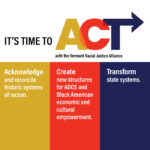Calls for Governor to Make Champlain Parkway the RIGHTway
PRESS RELEASE
For Immediate Release:
February 4, 2021

Media Contact:
Stephanie Gomory
802-505-5587 / stephaniegomory28@gmail.com
Vermont Racial Justice Advocates Request Governor to Make Champlain Parkway the Champlain RIGHTway
Vermont Racial Justice Alliance Proposes RIGHTway alternative to the Champlain Parkway
Burlington, Vt. – Today, the Vermont Racial Justice Alliance (VRJA) announced a plea sent to Governor Phil Scott on January 15, 2021 to address the racial and environmental issues related to the Champlain Parkway Project.
Though the project’s original intent was to improve traffic circulation, reduce traffic burdens in residential neighborhoods and improve motorist and pedestrian traffic, the Champlain Parkway as proposed will have a disproportionate impact on Black and Brown and poor people in Burlington. The pending implementation of the Champlain Parkway will result in a 37% increase in traffic in the Maple-King neighborhood in Burlington while decreasing traffic by 72% through affluent white communities.
“We are alarmed at the extent to which the Parkway disproportionately impacts Black and Brown and poor communities, as currently designed.” said Mark Hughes, Executive Director of the Vermont Racial Justice Alliance ”
Vermont and its Federal and City of Burlington partners recently conducted and published a Limited Scope Draft Environmental impact Statement (LSDEIS) to evaluate environmental justice issues for the first time. The study was conducted and released during the coronavirus pandemic and neither the City, FHWA, nor State provided adequate outreach to invite the community of Maple-King to participate in the process and development of the LSDEIS.
The Champlain RIGHTway was created in partnership with the Pine Street Coalition and Fortieth Burlington. To read the full letter presented to Governor Scott please visit: https://bit.ly/3jfMo1V
###
About the Vermont Racial Justice Alliance:
The mission of the Vermont Racial Justice Alliance is to secure sustainable power, ensure agency and provide security for American Descendants of Slavery (ADOS), while embracing their history and preserving their culture.

 Previous Post
Previous Post